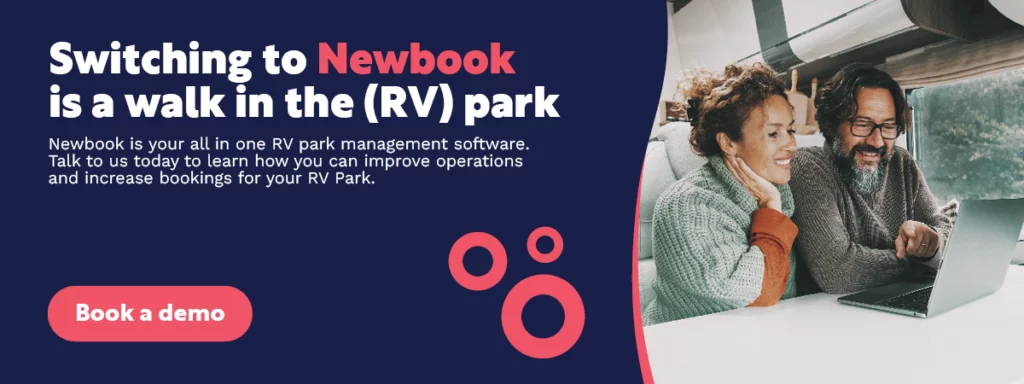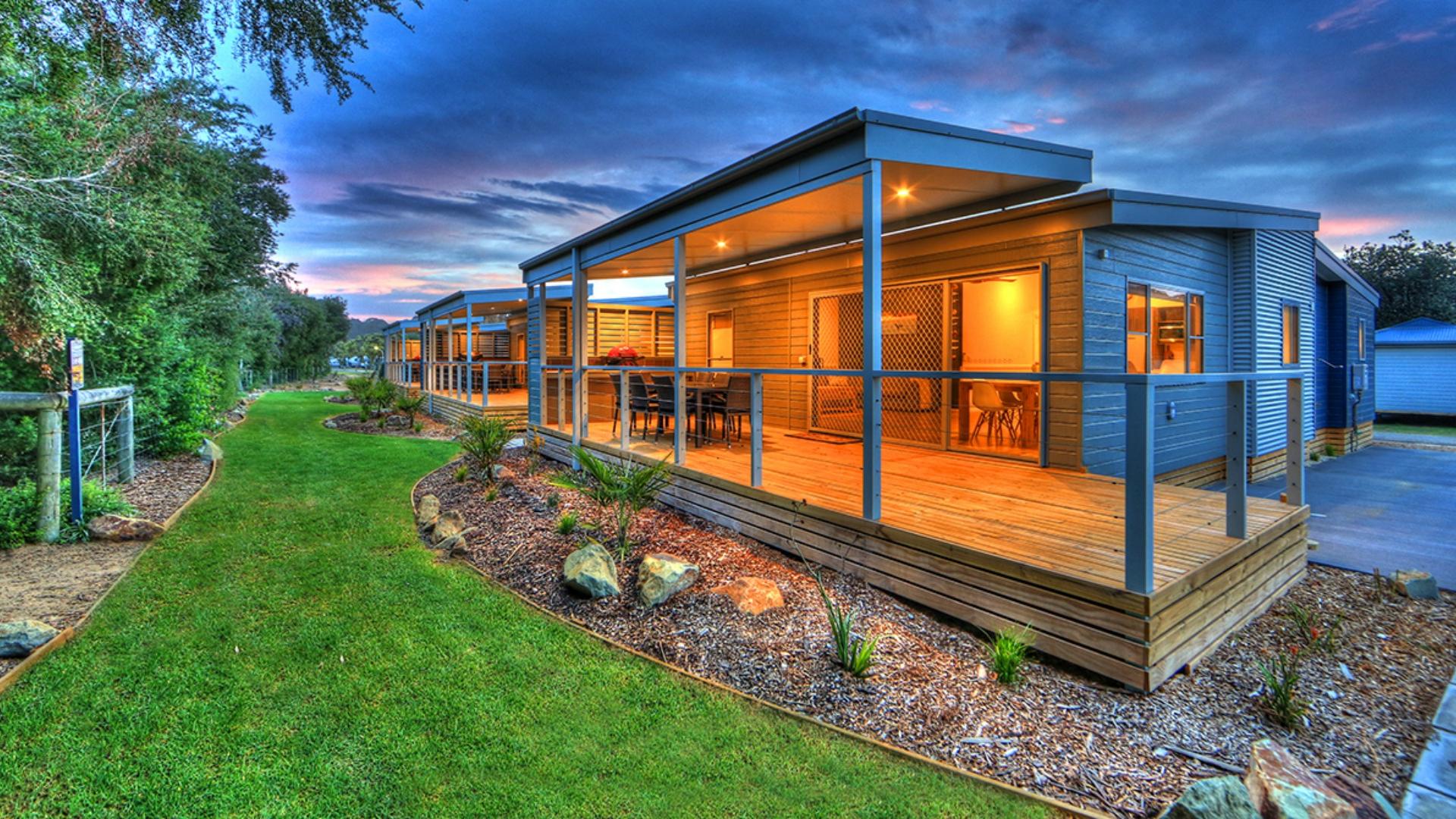You’re a guest who just arrived at a popular RV resort. The facility is nicely secluded in a natural area, but there are still amenities within a reasonable distance: stuff like restaurants, big box stores, attractions, the works. This particular RV park might seem like your standard fare, but there’s a big difference: there are no staff onsite.

Wait, What? How can an RV park function without staff being there? This supposed future of camping is all thanks to the power of automation.
The RV park industry in the United States is fast-growing—generating up to $5 Billion annually and projected to grow at a compound annual growth rate of 4.59% (just over $2 Billion per year) by 2027. As of 2023, there are more than 15,000 RV parks and campgrounds in the US and Canada. On average, guests stay between 2.5 to 3.5 nights. The demand for RV parks is also steadily increasing. In 2023, 61% of Americans planned to take an RV road trip, a 21% rise from the previous year’s 48%.
Given the steady demand and growth rate for RV parks, it makes sense that owners would seek more convenient management options, especially when it comes to state or province-run parks.
The idea of having a fully automated RV park is an attractive one for guests and owners alike. Guests can check in and out whenever they want, while owners don’t have to worry about having a staff member onsite at all times. Plus, an automated RV park works hand-in-hand with online booking—the guest is already used to having full control over their experience through self-service reservations, so why not during their stay as well?
This article explores more about automated RV parks, including full and semi-automated, different types of vacation rental automation, pros and cons of campground automation systems, and more.
What Exactly Is a Semi and Fully Automated RV Park?

There are options when it comes to RV park automation—semi and full automation. Some RV park accommodation providers prefer to inject some automation into their daily operations, like allowing guests to check in and out without having to visit the office and subsequently having the facility’s availability calendars updated.
Other owners prefer a fully automated RV park (common with state or province-run facilities or RV park owners with multiple properties) where guests fully control their own experience. Typically with fully automated RV parks, there is a number to call or otherwise some way to get in touch with someone should the guest need to for whatever reason. Because some or all services and amenities are automated, the RV park owner saves money on staff costs.
As an RV park owner, the difference between a semi and fully automated RV park will likely look something like the table below:
| Semi-Automated RV Park | Fully Automated RV Park |
|---|---|
| – May still have an office and office hours, but check-in and check-out can still be automated through a website or application – Payments can be handled in person (provided staff are present), through a self-service kiosk onsite, or online – Staff are there during certain hours for direct interaction with guests, but guests can still access self-service options online or onsite (such as self-service kiosks) – When a guest successfully books, some operations may start automatically, such as the meter for the site, while others, like pre-check-in campsite checks, are handled manually | – Staff are rarely present (if ever); check-in and check-out are completely automated – Payments are typically handled completely online through a website or app, but some fully automated RV parks have self-service kiosks that can accept payments as well – Typically have easy pull-through sites that are consistently sized and can accommodate small and large units so it doesn’t matter which spot a guest chooses – Amenities, such as hook-ups for a specific site, are turned on and off as the guest checks in and out – There is usually a phone number to call or another way for guests to get in touch with staff (such as a website) if needed |
What to Expect at an Automated RV Park
From a guest’s point of view, they can expect an automated RV park to have the same features as a semi-automated or non-automated park, with the added convenience of having amenities and services available on demand, even if they check in after standard hours. Usually, fully automated RV parks will have heightened security measures in place, like locked amenities that can be unlocked with a keycard or code by registered guests.
Other important aspects of a fully automated RV park that guests can expect include:
- The ability to check in and out at any time. In other words, 24/7 access.
- The ability to make changes to your stay on demand. One great thing about automated campground systems is that the guest can fully control their experience. If changes need to be made, for instance to their expected arrival time, the site they choose to camp at, or they want to add services, this can all be done online through the campground’s website or application. For example, with Newbook’s online booking system, guests can go back and make ad-hoc adjustments to their reservations easily.
- Guests will usually receive a code that can be used for multiple different amenities and services, like dumpster access, activating on-site hookups, access to onsite bathrooms and showers, and more. Usually, a reservation will also include the campground’s WiFi access code as well.
Are Automated RV Parks the Future of Camping?
In many ways, automated RV parks are the future of camping because they allow more facilities to open, giving travelers more options for overnight parking and general camping. Because automated RV parks can run mostly autonomously, the costs and logistics associated with hiring staff to be onsite at all times are eliminated from the equation, reducing the overhead costs of operating and maintaining an RV park.
Aside from operating cost savings, RV park automation aligns with the needs of the modern customer. There is a lot of talk about personalization and its current role in marketing. In the hospitality industry, personalization is a key way that all accommodation providers—campground and RV park owners included—can drive repeat guests and encourage direct bookings.
OTAs, or online travel agencies, drive a ton of online bookings for campgrounds and RV parks. The convenience of being able to visit one website and tailor your search for the perfect camping spot in just a few clicks is much more convenient than using a standard search engine and visiting individual websites for each accommodation provider. Typically, when guests find accommodations they like through an OTA and have a good experience staying at the campground or RV park, they are much more likely to book directly with that provider next time.
Combined with the billboard effect, it’s more important than ever for accommodation providers to incorporate technology into the daily operations of their facilities, and RV park automation is one important way to do so. Through RV park automation, accommodation providers can give their guests more direct control over their experience by allowing them to check in and out when they want, be in full control over which amenities they use and don’t use, and even entice guests with loyalty programs, discounts, and other offers that are tied directly to their guest account. So even though there’s less human interaction going on, personalization is still a focus.
While automated RV parks can absolutely be used for camping, they also help address the growing issue of accessible, safe, and affordable overnight parking areas throughout the United States. From truckers, people who live in a recreational vehicle either full-time or part-time, and people who are traveling and just want a safe space to rest without having to pay for a hotel, automated RV parks can be a great option.
Types of Vacation Rental Automation
There are a variety of different types of vacation rental automation that you can implement for your accommodation business. These different automation options are aimed at improving your business’s efficiency and streamlining operations so you can focus on higher-value tasks, like delighting your guests or providing more amenities and services.
Here are the main types of vacation rental automation that can work for any type of accommodation business, including RV parks and Campgrounds.
1. Online Campground Booking System
Allowing potential guests to book accommodations through your business online is essential. Providing them with a seamless online booking experience—one that lets them customize their entire stay—is essential. Newbook offers a robust online campground booking system that gives your guests flexibility and control over their experience:
- Interactive maps allow guest to choose their preferred spots easily, with form options that allow them to enter their unit size so that spots they will fit in will only be shown. Plus, the interactive map can show available spots for more than one property.
- The inclusion of extras in the booking process makes it easy for guests to add amenities and services to enhance their vacation experience seamlessly during the booking process without having to do so separately afterward in a different area of the website.
- Easy and flexible payment options allow guests to pay for their stay immediately or divide their payments on a weekly, biweekly, monthly, or yearly basis depending on their length of stay and your RV park’s stay options.
- Mobile responsive so that it’s easy for guests to book their stay regardless of whether they are using a smartphone or computer.
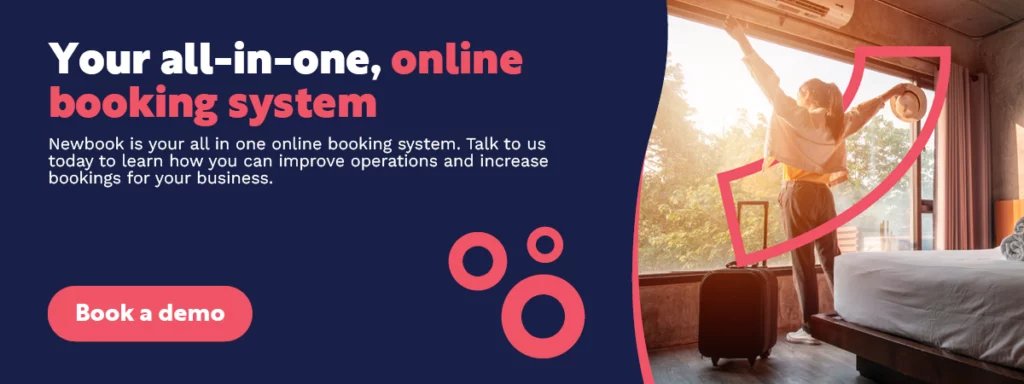
2. Self-Service Kiosks
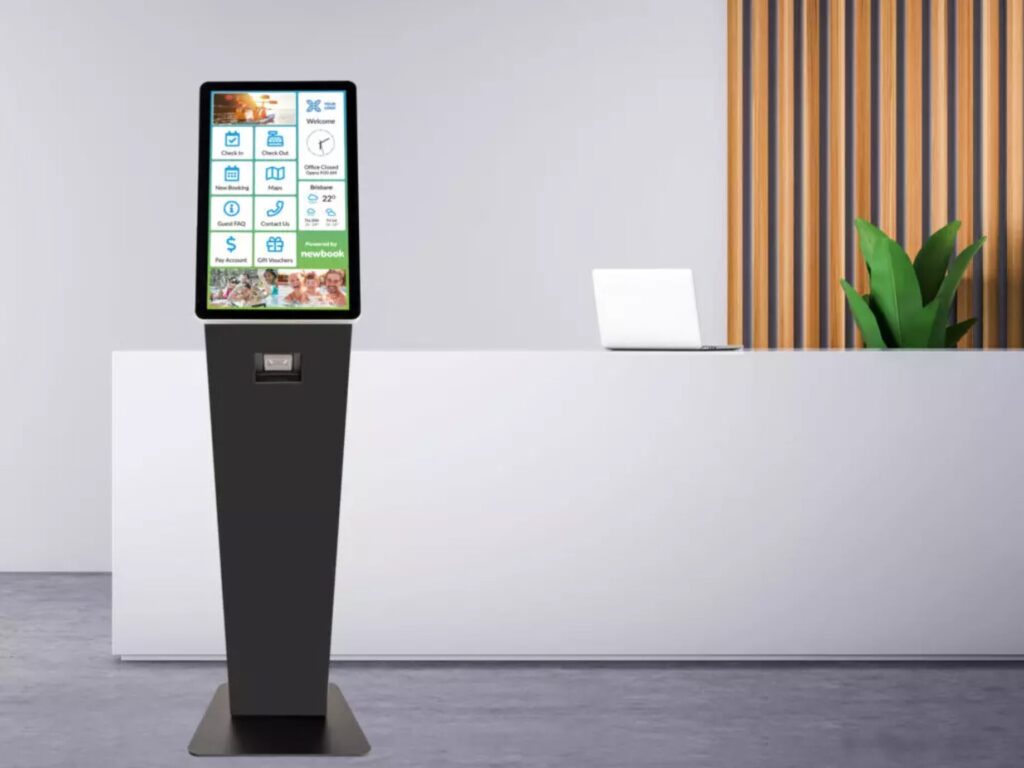
Another way to incorporate self-service options into your accommodation business is to utilize self-service kiosks. These are standalone units that incorporate booking software like Newbook into them, allowing a guest to make a reservation without having to wait for an employee. Every aspect of the booking process is incorporated into the kiosk’s interface, from selecting the appropriate campsite as well as additional services and amenities, and payment.
Self-service kiosks are a great option when internet connectivity is low or in busier areas where guests tend to spontaneously choose a campground and walk up to the facility looking to make a reservation. This way, they can immediately book without having to pull out their phone and figure out which website to visit.
3. Key Café
For some types of accommodation businesses, self-service kiosks are a great way to incorporate the convenience of automation when you have physical properties, like cabins or villas, that guests can rent in addition to camping sites.
With a key café, when guests want to check in, they can simply enter a code at the key café lockbox to retrieve their cabin or villa key. When they are ready to check out, they place the key back into the box and enter their code again to lock it.
Once a key has been removed from a lockbox or put back into it, a notification can be sent to the appropriate staff member or owner to let them know.
4. Property Management Software (PMS) Automation
Once a guest makes a successful booking, there are a ton of automation that you can schedule to trigger via your Newbook PMS:
- Automatic availability updates for all of your OTAs. While listing with multiple OTAs is lucrative, having to manually update each listing every time a booking is made can quickly become impossible. Newbook’s built-in channel management software features real-time updates on availability so that regardless of which channel a guest used to book with you, the new availability is automatically updated on all channels, including direct.
- Automatic pricing updates. Combined with Newbook’s dynamic pricing feature, you can take a hands-off approach to managing the pricing of your campsites. Dynamic pricing gives the system the flexibility to adjust prices based on current and historical data (within the parameters that you set) so you can maximize vacancy at all times. Combined with real-time updates for all your OTAs, you can ensure that accurate pricing is always reflected on any website that you have your accommodations listed on.
- Task scheduling. Once certain actions are performed, like a new booking coming in, you can set your PMS to automatically schedule certain tasks for specific team members. For example, once a campsite booking has been completed, there could be a reminder scheduled to start the meter reading once the guest has checked in.
5. Automated Emails and Notifications
Some property management systems, such as Newbook, provide built-in marketing tools like the ability to create email and SMS campaigns. Sending your guests periodic messages at the right time is a great way to keep your business in front of mind, keep your guests informed about the latest promotions and offers, and more. You can schedule certain emails or SMS to be sent at the right time through automation.
For example, let’s say that a guest’s scheduled check-in time is fast approaching. An automated email can be sent that reminds them of their check-in date and time and provides them with a link so they can make changes if needed. The same can be done for payments. If you have long-term guests, an automated email or SMS reminder in advance of when their next payment is due goes a long way in ensuring that you get timely payments.
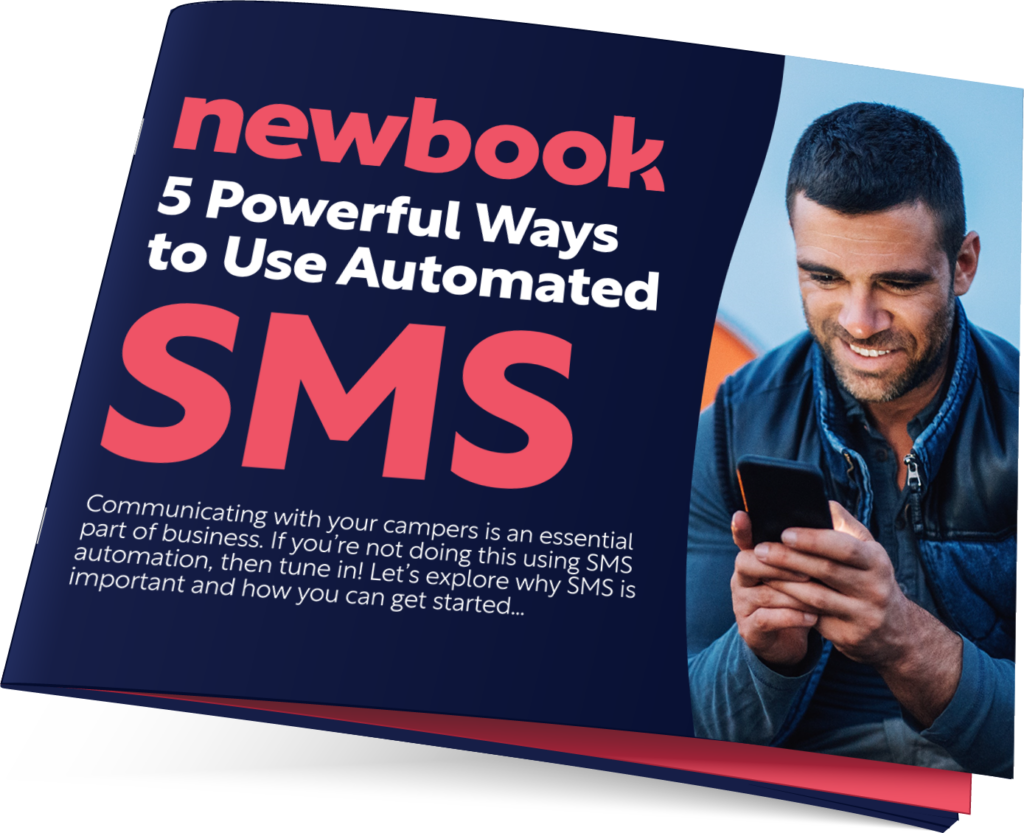
“We made an additional $7000 in one month by using SMS Late Check-Outs.”
– Kathleen Walsh, Advanced Outdoor Solutions
Find out how you can too!
Pros & Cons of Campground Automation Systems
Implementing campground automation in your business’s daily operations has many advantages, but there are also potential drawbacks that you should be aware of as well.
| Pros | Cons |
|---|---|
| – Saves on staffing costs, especially since automation often means not needing to have staff onsite at all times – Reduces or eliminates the need to perform tedious and repetitive tasks manually by automating them instead – Streamlines the guest experience by keeping a consistent flow between booking, check-in, and check-out – Guests don’t have to wait in line at the front office to check in or out | – Less direct human communication – Glitches and other software issues mean that the guest has to contact someone over the phone, through online chat, or email, which could delay prompt help |
While one of the cons of campground automation is less human interaction, the time and money savings from both the guest and business owner’s point of view make the trade-off more than worth it. The business owner saves money on wages and overall staffing costs, while the guest is able to have more direct control over their vacation experience and overall stay.
For example, consider how easily roadblocks can hinder travel plans: construction or accidents can affect consistent road travel, and sudden weather changes can cause delays. With automation and self-service options, it’s easier for guests to take control and adjust arrival times, stay length, and more without directly contacting the RV park. And, because of campground automation, the changes are automatically reflected in your business’s operations, with availability calendars and check-in times being updated in real-time in line with the guest’s changes.
Steps to Creating an Automated RV Park to Boost Revenue

Adding full or partial automation to your RV park’s operations doesn’t have to be a difficult process. Using Newbook as an example, here is a step-by-step process on RV park automation to make managing your campground easier and more efficient:
1. Centralize Your Operations with Newbook’s PMS
Your PMS is your hub for your business’s operations, including daily tasks, customer service, and revenue management. Think of it like the central point in a spider web, where every thread connects. With Newbook’s PMS, you can view important information at a glance, such as bookings, tasks assigned to staff members, and more. Plus, you can manage automated communications like guest and staff notifications, schedule automated reports to be generated, manage payments, and much more.
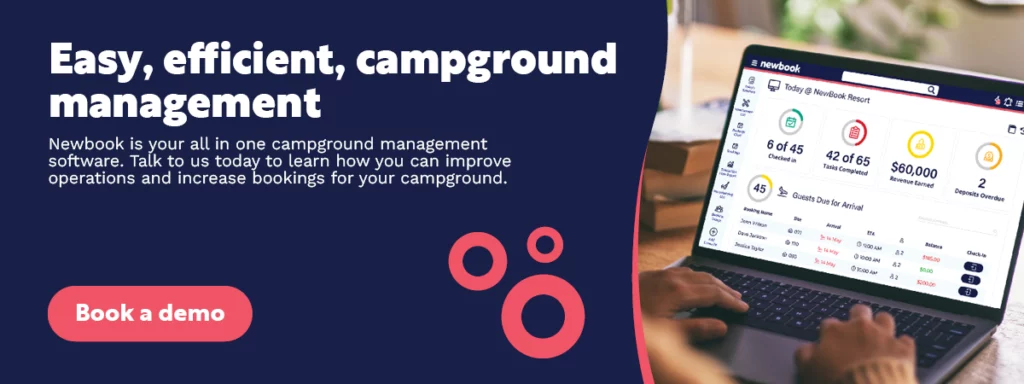
2. Set Up Your Online Booking System
The online booking system is the bread and butter of your business. Easy, effective online booking software is essential to attract and retaining today’s travelers. They are looking for ease of use, convenience, and robust stay options while booking and Newbook’s software can provide all of that. For example, if your RV Park has multiple types of spots, such as ones that differ in size or view, you can include that information in the booking process via an interactive map. In addition, you can set it up so that the guest must put in the size of their recreational vehicle so that appropriate spots can be automatically filtered.
Aside from showcasing spots to the guest that will work for them, you can also incorporate upsells during the booking process—a kayak rental for your RV park that’s near a pristine mountain lake or a bicycle rental for your RV park that’s in the city—anything goes and can be customized to suit your property.
Plus, Newbook supports centralized booking, which means that if you have multiple properties, the booking information goes to one place for ease of management, regardless of the source of the booking.
3. Streamline Your Channel Management
Managing every OTA that you list manually is a tiresome chore. Newbook’s built-in channel manager eliminates the need for you to visit every OTA website and manually make changes by enabling you to manage all your listings in one place. So when you need to update your listing’s description and images, you only have to do it once per property. Also, the channel manager supports real-time pricing and availability updates, so you can be sure that guests are always viewing the latest prices and vacancies, eliminating the chances of double bookings and incorrect pricing.
4. Facilitate Integrations and Connections
Chances are pretty high that you use multiple pieces of software to manage your RV park. It’s important that these different pieces of software work seamlessly together to prevent siloed information and to ensure that your operations continue to run smoothly. Newbook supports a wide range of software integrations for popular accommodation management software, including payments, OTAs, Point of Sale, Revenue management, and more. Our robust developer tools, including an API, are available for custom integrations.
Conclusion
The rise of automated RV parks marks a pivotal shift in the camping experience. This innovation not only meets the rising demand for RV parks but also aligns with the evolving preferences of modern travelers. The absence of on-site staff might initially raise eyebrows, but it’s a testament to the power of automation shaping the future of camping.
By offering fully or semi-automated options, these parks cater to diverse needs:
- Guests gain unprecedented control over their stay, enjoying the convenience of 24/7 access, customizable experiences, and heightened security measures.
- Owners, meanwhile, benefit from reduced staffing costs and streamlined operations thanks to technologies like online booking systems, self-service kiosks, and property management software.
Get started with your RV park automation with Newbook. Contact us today to learn more!
